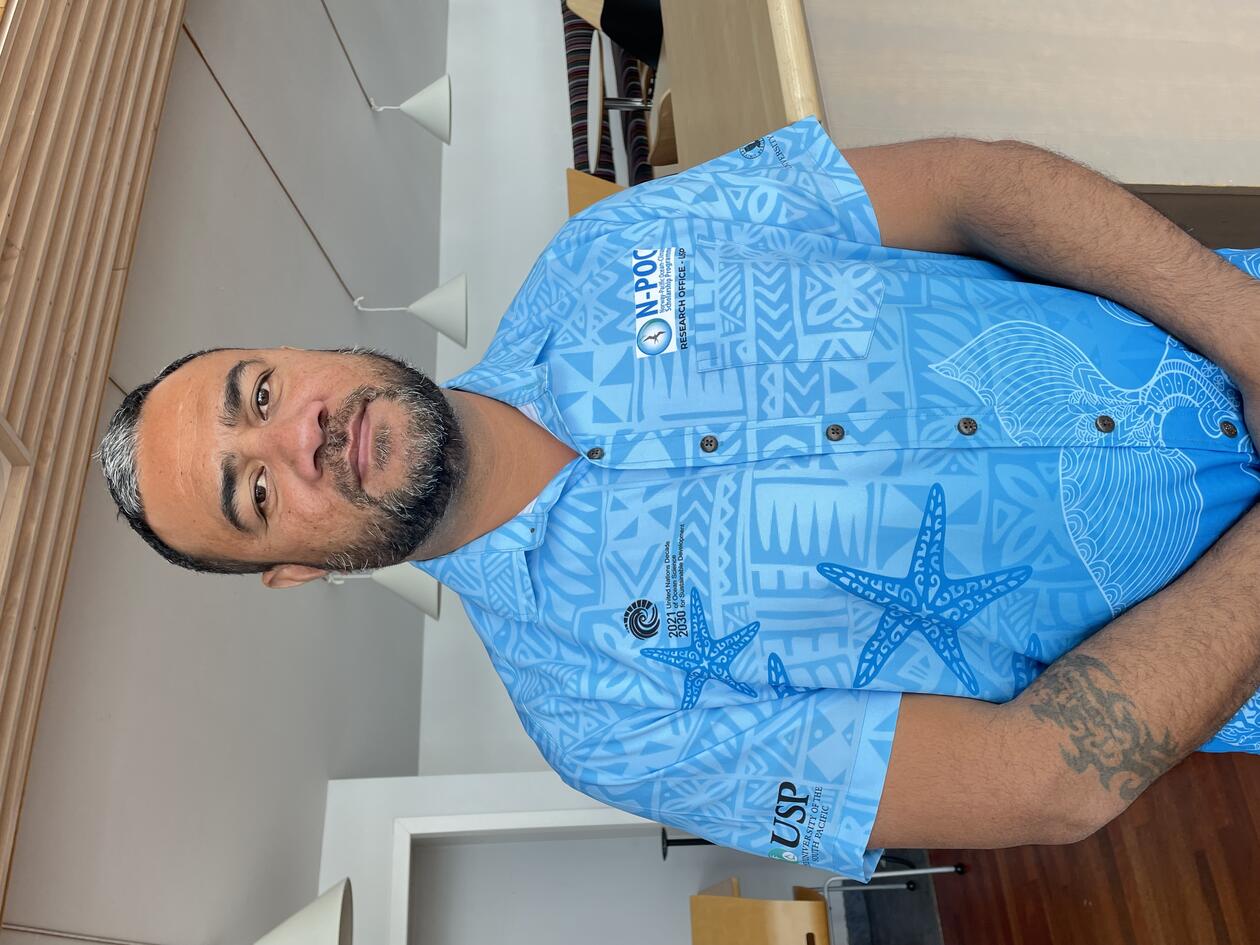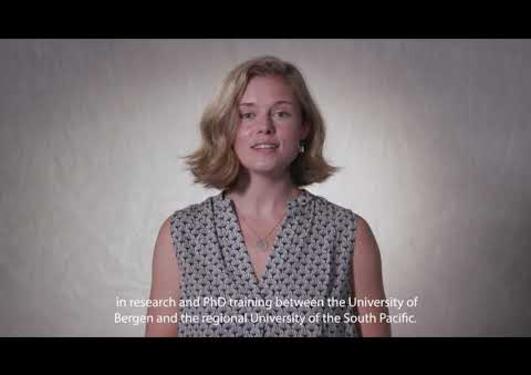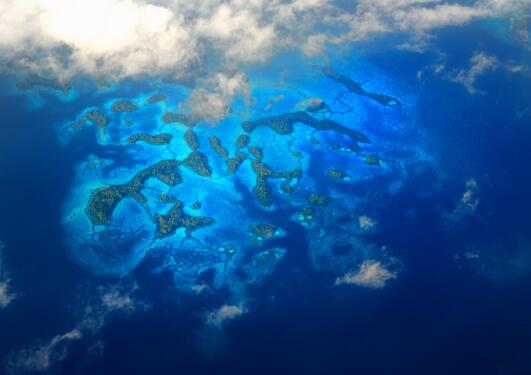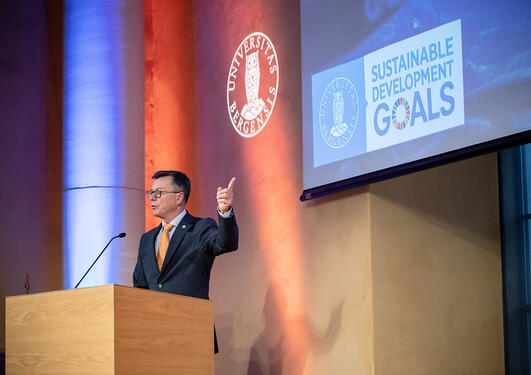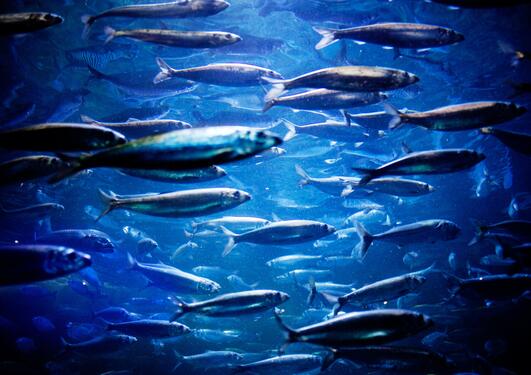Pacific encounters in Bergen
The Norway-Pacific Ocean-Climate (N-POC) Scholarship Programme was an active ingredient at the 2024 Bergen Summer Research School, bridging ideas of scientific knowledge and traditional knowledge on the ocean-climate nexus during two hectic weeks in Bergen.

Main content
During two weeks in the first half of June 2024 a group of 17 PhD candidates from the Norway-Pacific Ocean-Climate (N-POC) Scholarship Programme at the University of the South Pacific participated in the 2024 Bergen Summer Research School. We spoke with two of them showing the reach and multidisciplinarity of the programme.
Looking at legal perspectives
“My PhD project looks at the legal perspectives both from a political and scientific point of view with a particular look at the United Nations Convention on the Law of the Seas (UNCLOS). One of the things I want to achieve in my project is how the UN can help to create and change the understanding of sovereignty,” says Mr. Kiali Molu, who is from Tuvalu and has previously worked for the Tuvalu Ministry of Foreign Affairs, “My country Tuvalu has been scientifically proven to be under water if the CO2 emissions are not stabilized and reduced in the next decade.”
He asks: “If that happens, how can we maintain our sovereignty as a state? How can we come up with an idea to pin down or change the mindset of sovereignty in current global discourse?”
Molu goes on to point out that statehood and sovereignty as we know it is a concept defined by Europeans. But he now sees hope in the Biodiversity Beyond National Jurisdiction (BBNJ) agreement, which was adopted by the UN’s member states one year ago, in June 2023. The agreement is now being ratified and implemented around the world.
“Anything that relates to the ocean and to the sea and to the climate and the resources, are all dear to us small island states,” he says, “BBNJ is part of my project and what I will investigate in my PhD. I’m particularly curious to look at the language used in the agreement and how this will be viewed by member states during implementation. As part of my project, I look forward to talking to people at the UN and other small island developing states to gather their understanding and how the agreement can support the fight of Pacific island states to maintaining our statehood and sovereignty in the face of sea level rise.”
A journey around and for the ocean
“My background is marine science in the ocean. My whole journey has been around the ocean. Both as a private person and as a scientist,” says Ms. Laura Virginia Williams, who has her entire academic career from Fiji and the University of the South Pacific before becoming an N-POC doctoral fellow.
“With the PhD I’m taking a completely different turn towards the ocean. My master’s was on looking at the potential for local species to be used in aquaculture. For the PhD I’m taking in the whole body of oceanography by combining physical oceanography with chemistry and biology components. Using knowledge from these various disciplines to consider environmental effect.”
She’ll be looking at how plumes and blooms travel from the Suva bay surrounding Fiji's capital city to the open sea, and since enrolling in the N-POC programme in July 2023, she’s been gathering samples from the bay and spending long hours in front of the computer to analyse this data. She also brought her own water samples to Bergen for further analysis at UiB.
“I’m now compiling this in a data base which is a key part of my PhD work. I will take pockets of data and clean it and compile it and look at patterns in the bay. Are there obvious patterns that are popping out? Different trends of variables? And then comparing it to my work,” she says.
Developing a new methodology
Kiali Molu also enrolled as an N-POC candidate in July 2023 and describes the first year and developing his methodology as a PhD as enlightening.
“For the first six months, you’re supposed to work on your proposal to be confirmed as a PhD candidate and writing your proposal. I was researching the background and the rationale of my PhD. Why I really wanted to do this project before convincing the PhD committee of my purpose,” he says.
“The second six months was mostly about planning, writing my literature review, and doing field work. When we go to the United Nations right after the Bergen Summer Research School, I will stay for a week longer than the rest of the N-POC cohort and continue my field work within the UN with a particular focus of speaking with Pacific island states and other small states groups.”
Praise for the Bergen Summer Research School
They are both full of praise for the enriching discussions at the 2024 Bergen Summer Research School.
“I come from hardcore natural science. It’s been an eye opener to discuss how differently we carry out research across disciplines. I never thought of my research as transdisciplinary. But through discussion and learning all these terms I realise that my research is transdisciplinary,” says Laura Virginia Williams.
“It’s been outstanding. Very fruitful both from a student and research perspective to enter debates on different types of knowledge and how they interact. Being at Bergen Summer Research School has provided me with new world views and to look at my study not only as a Tuvaluan but from other perspectives,” says Kiali Molu.
“I used to have this mono-disciplinary perspective. Just look at my project and politics. My study is now really into the transdisciplinary. A need to incorporate traditional or local knowledge and a need to incorporate scientific knowledge in my project.”
They were also full of praise for the way the Bergen Summer Research School pushes the participants to think along the science-policy nexus, not the least that everyone is expected to produce a policy brief as part of the school.
From Bergen to the UN
After two weeks in Bergen the N-POC group headed for a daytrip to Oslo to meet with representatives from Norway’s Ministry of Foreign Affairs and the Norwegian Agency for Development Cooperation (Norad) and present their research there, before another two weeks in New York engaging with several UN entities and missions, including close participation in the UN’s annual ocean dialogue.
“We all look forward to seeing in real time how the global negotiations on the ocean-climate nexus happen. It’s going to be a once in a lifetime experience to witness how research ties into policy and how this can be used in diplomacy and towards policy making. I look forward to presenting the fresh findings that we bring from Bergen at the UN in New York,” says Laura Virginia Williams.
